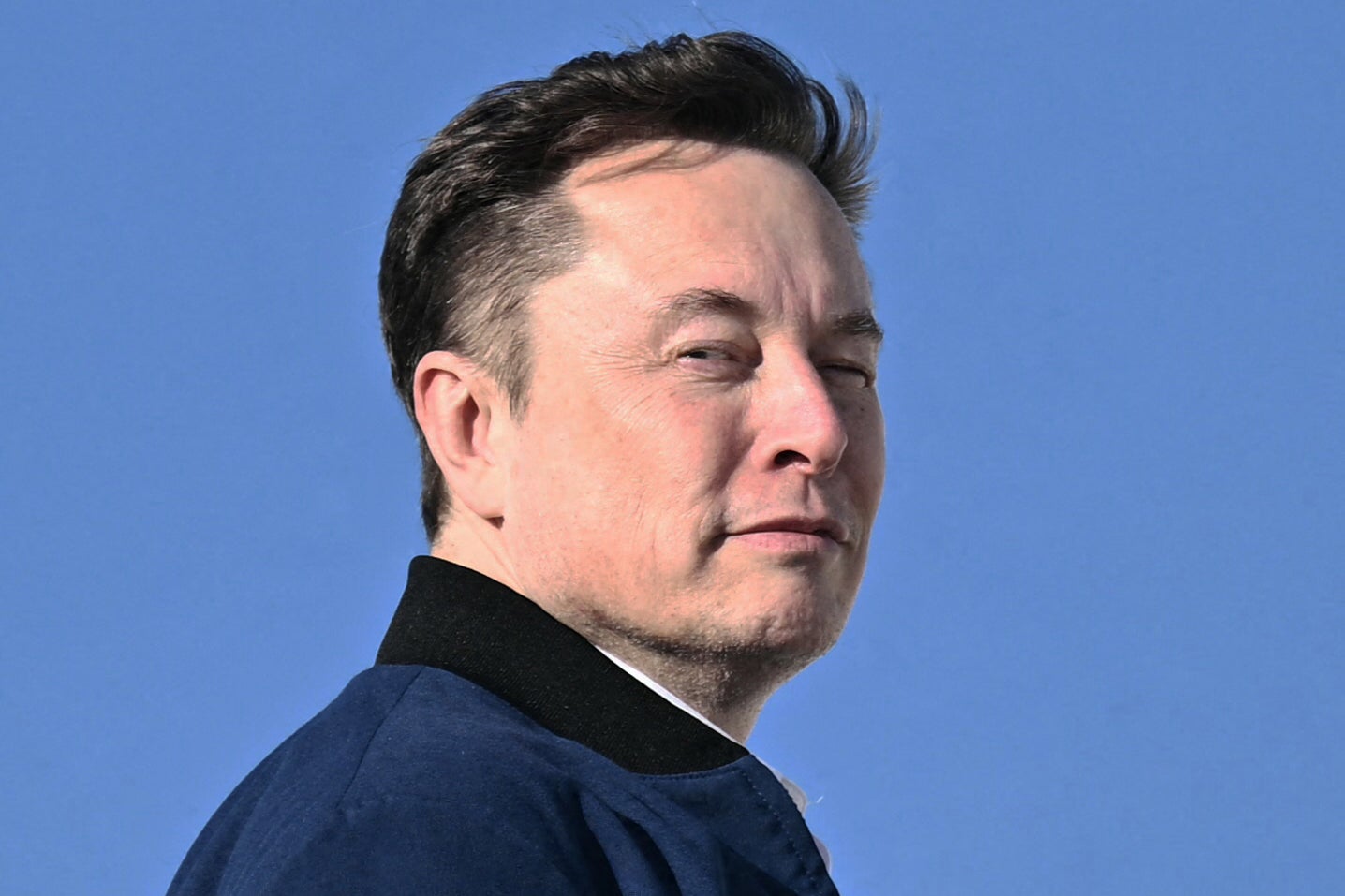For once, the billionaire’s First Amendment crusade isn’t total nonsense. Blame Minnesota.

Sign up for the Slatest to get the most insightful analysis, criticism, and advice out there, delivered to your inbox daily.
“Free speech” was the battering ram that Elon Musk used to justify his pursuit of Twitter in 2022. He talked about the platform as the new digital town square. He said social media companies’ moderation policies should be no more restrictive than national laws. “I hope that even my worst critics remain on Twitter, because that is what free speech means,” he wrote after agreeing to a $44 billion takeover. In the three years since making the deal, Musk has continued to cloak himself in the armor of a free speech warrior, out there fighting for the rest of us. “Turns out free speech is very expensive,” he said a year ago, urging all of us to support this bedrock principle by … subscribing to X Premium.
It’s been a lot of sizzle and the opposite of steak. Musk unbanned a bunch of right-wing (and even some left-of-center) accounts, pitching that as an anti-censorship move. (He allowed back some legit Nazis, but also the Krassenstein brothers. Fair is fair.) But he also banned and suspended accounts, like the one that did nothing more than share public information about his own private jet usage. He tried to restrict people’s linking to other social media platforms, only bailing from that effort after a heartwarmingly cross-ideological backlash. He has sued researchers who have reached damning conclusions about Nazism on X. He has juiced the platform’s algorithm to send ideologically friendly posts soaring, while throttling posts with links to outside information. Few people have ever done less to promote the free and open exchange of information on the internet.
So it’s notable that lawmakers in Minnesota—Democratic ones, at that—have given Musk an opening to sell himself as a free speech guy in a manner that is not just a fugazi. Through his company, X, Musk filed a lawsuit on Wednesday in federal district court that puts him on the free-speechier side of a debate. These lawmakers have created a double whammy: a law that could genuinely curtail free expression online and a public relations coup for Musk, whose own interests intersect with a free speech argument.
One can see the idea behind Minnesota statute 609.771 (“USE OF DEEP FAKE TECHNOLOGY TO INFLUENCE AN ELECTION”). A.I. deepfakes could bork our information ecosystem even worse than it is already borked, making it so that people can sparsely tell what is real online and what is not. Minnesota lawmakers have been rightfully concerned about deepfakes in two contexts: sex and politics. The state’s statute against nonconsensual sexual deepfakes has not generated as much controversy. Most people agree, or at least don’t fight the idea, that there is no social utility in letting people indulge their creative urge to ruin other people’s lives with A.I.-created sexual imagery.
The state’s statute about deepfakes and elections—first signed into law by Tim Walz in 2023 and updated in 2024—is thornier. The whole thing is just a few paragraphs and list points. The law sets out a detailed, noncontroversial definition of a deepfake, and then states that “a person who disseminates a deep fake or enters into a contract or other agreement to disseminate a deep fake is guilty of a crime” under certain circumstances. In Minnesota, it’s a crime if the person knows (or “acts with reckless disregard” in not knowing) that a deepfake isn’t real and shares it during an election season “without the consent of the depicted individual” and “with the intent to injure a candidate” or influence an election. Punishments range from small fines to up to five years in prison. (Candidates for state or local office are barred from office if they’re convicted of this crime.) The state attorney general, Keith Ellison, is nominally supposed to enforce this law, and so he is the named defendant in Musk’s lawsuit.
The most glaring issue with the Minnesota law is that if you CTRL-F your way through it (and again, it’s not long), you will not find the words parody or satire or any collection of words pointing in that direction. Now, I do not personally have a great problem with simply banning all deepfakes out of hand. I find that deepfakes, even ones that are supposed to be funny, are almost never funny. They strike me as a waste of electricity and a piss-poor substitute for more thought-intensive forms of art. If a constitutional amendment were on the table to make all deepfakes of any intention punishable by up to 10 years of watching an awful A.I.-generated Harry Potter spinoff on a loop, I would support that amendment.
But in the world we have now, criminalizing political deepfakes without a satire exemption is like fighting gravity. No, it’s not essential to democracy that you be able to look at a sloppy deepfake of FBI agents hauling Donald Trump into custody. No, the American experiment does not rest on your ability to see a made-up image of Kamala Harris and Barack Obama carrying on an affair. But criminalizing parody opens up enough dangerous doors that even the most self-interested people who oppose it are onto something, and it sure does seem like this law could criminalize parody. It doesn’t carve out permission for people to share obvious fakes in service of some larger political point. In this way, it differs from California’s similar law, which does exempt parody but is still in jeopardy of going down in the courts.
Enter Musk, who is not the first person to sue over Minnesota’s law but knows a layup when he sees one. Musk brings the suit through X. He has a business case for being involved, arguing that the law turns the government into a social media moderator and imposes unfair liability on sites like Musk’s. In the filing, X’s lawyers share just the kind of deepfakes I described—these ones, of Trump’s imaginary and violent arrest in the streets—and makes the case that because the deepfake exists on its platform, it is “disseminating” it and could be in big trouble under the text of the Minnesota statute. The lawsuit only spends a little time on satire and, given Musk’s position, more on his platform’s liability.
Well … he’s right! He’s just right. You may not be particularly concerned with the liability of a social media platform controlled by the right-wing billionaire whose free speech maneuvering has not been on the level for years. But in this case, Musk isn’t the only theoretically liable party. So is any creatively challenged dork who believes they’ve got a hilarious parody deepfake in the hopper that they absolutely must share during a political campaign. If you post one of these deepfakes, your friends should make fun of you until you cry. You should be cyberbullied, even. But jailed? Maybe for a few days, if the deepfake is especially cringe. But generally not. Some problems are best confronted with social sanctions rather than criminal.
Musk’s lawyers use some overcooked language that may remind you who they are working for. They claim that the law will create “blanket censorship,” a line that may make your eyes roll out of the back of your head when you remember that Musk now co-runs the executive branch with someone who sues media companies over coverage he disfavors and muses about making it easier for public figures to prove libel. You do not, in general, have to hand it to the man. But that’s exactly why it’s such a gift that Minnesota has given Musk this opportunity to fight for free speech, rather than “free speech.”
X demands a jury trial. It wants the court to declare that the law violates the First and 14th amendments and is null and void, and it wants an injunction that would prevent the state AG from enforcing the law. Musk, as always, has a self-interest. It seems unlikely that Ellison has the time to drink from the firehose of political deepfakes on the internet and do a bunch of prosecutions of individuals every election season. There may very well be a way that he can devote time and resources to coming after a social media company like X, though, and Musk and his lawyers would like to preempt that possibility.
The Venn diagram of what advantages Musk and what advantages the free flow of ideas in a democracy has historically just been two circles that have nothing to do with each other. But here, the diagram has the tiniest overlapping section in the middle. You just have to squint at it for a minute.
Sign up for Slate’s evening newsletter.









 English (US) ·
English (US) ·